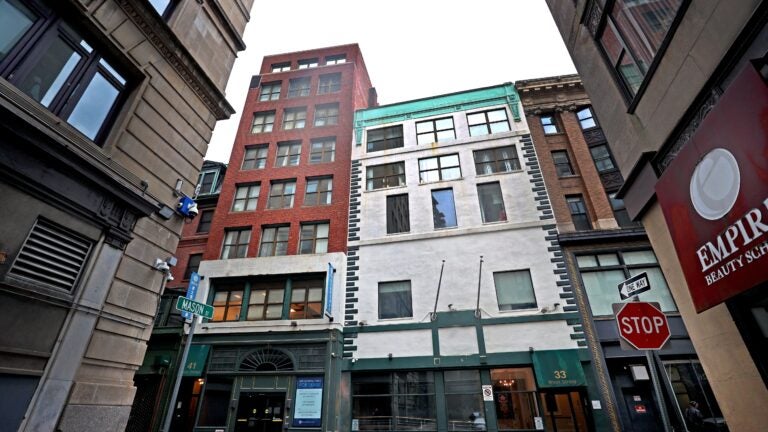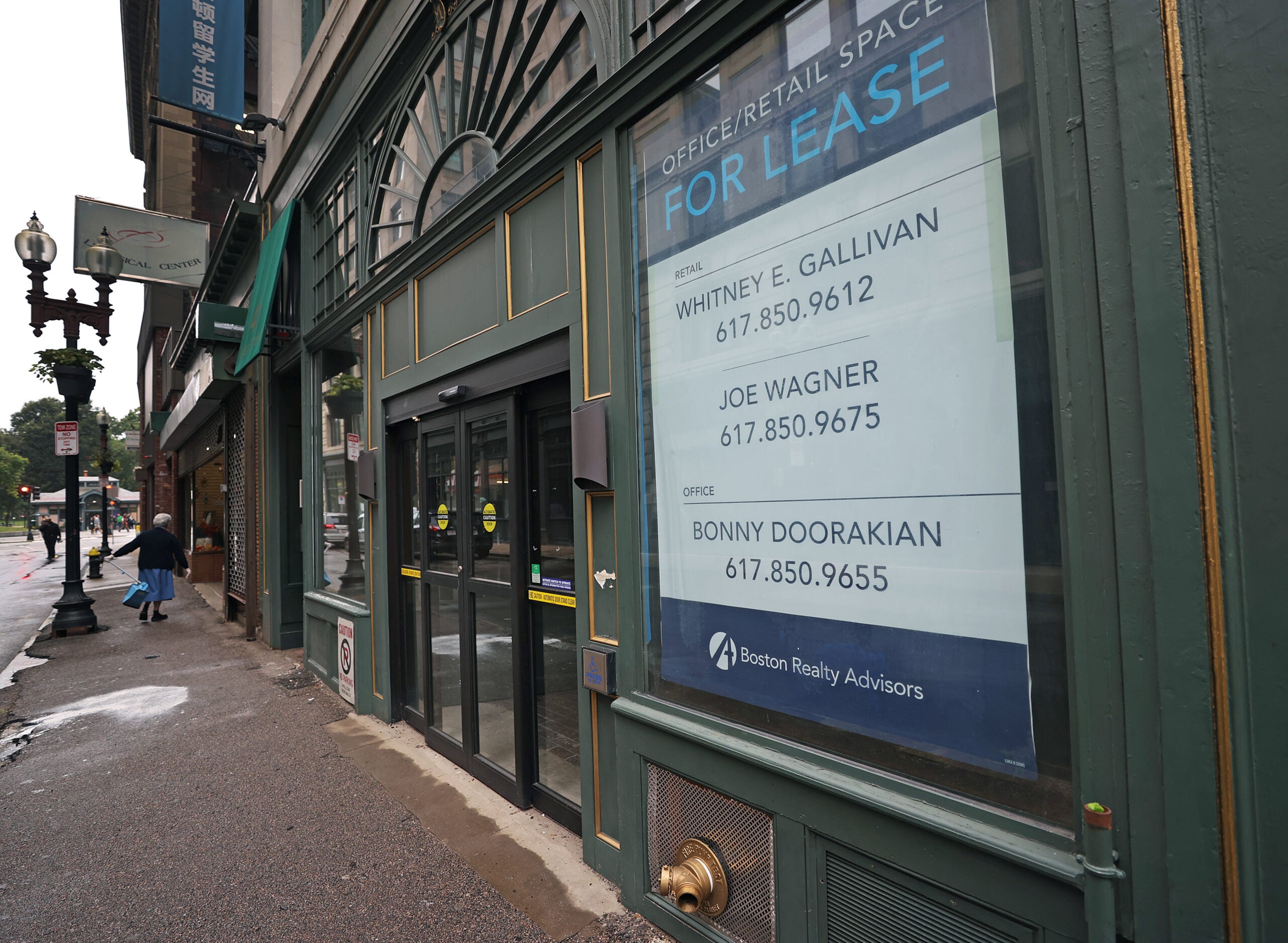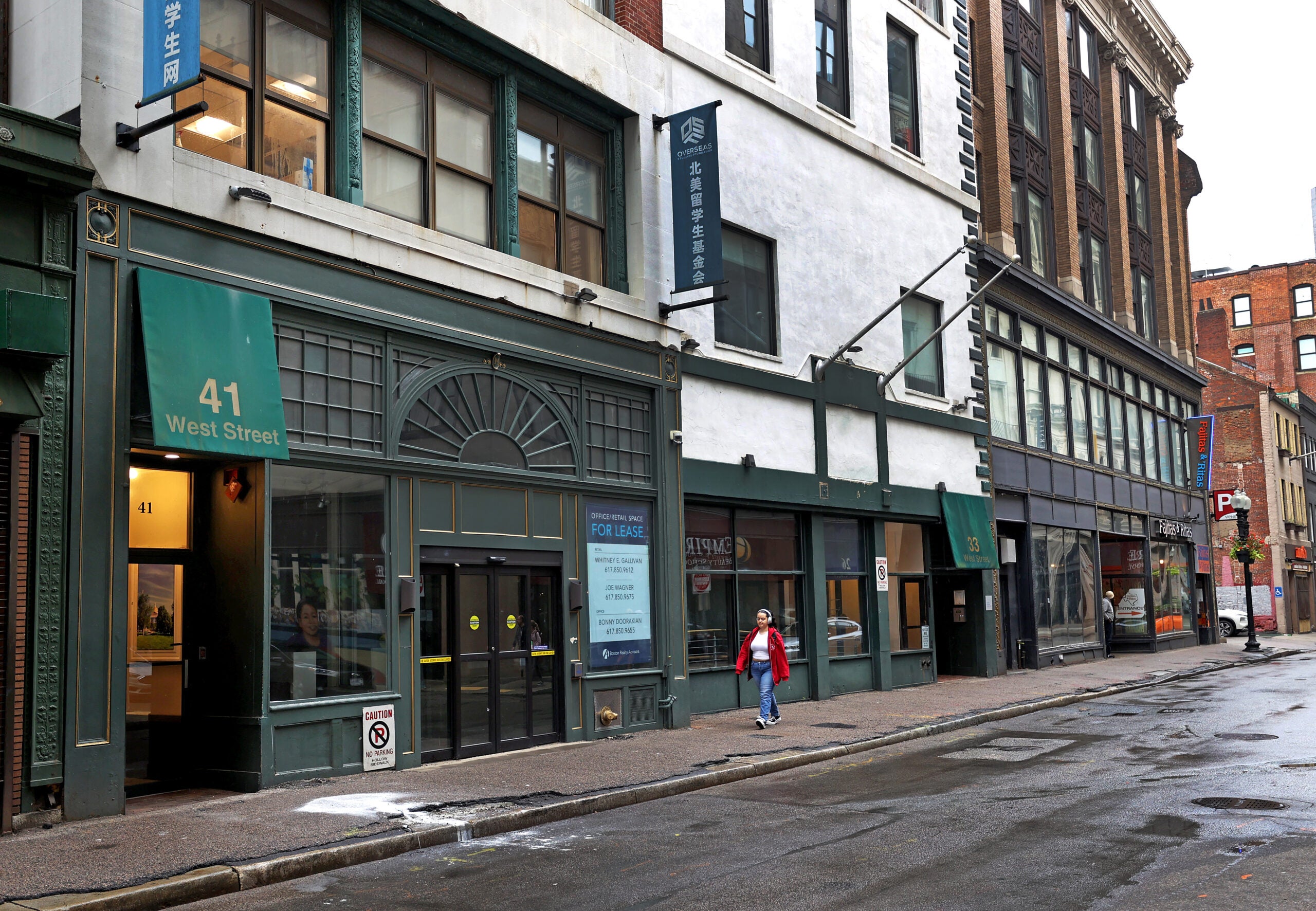The Boston Globe

In the middle of West Street, a one-block stretch between the Boston Common and Downtown Crossing’s main drag, sit two conjoined, nondescript buildings that encapsulate the current struggles of the downtown office market.
The pair of office buildings at 33-41 West St. — one five stories with a dingy white facade, the other, eight floors of red brick — are about half full, like the street itself, with empty lots and buildings surrounding a dormitory for Suffolk University, nonprofit and union offices. Shoppers meander through the $1, $3, and $5 outdoor racks at Brattle Book Shop; a few lots down, a developer has proposed turning a surface parking lot into a hotel.
Seven years ago, this pair sold for $16 million; late last month, they fetched just a quarter of that at $4.1 million — a warning of the possible distress facing much of the city’s older, less full office stock.
“There’s no secret right now: the office market is challenging,” said Mai Luo, a local real estate executive who bought the West Street buildings. “However, I’m optimistic for the future.”
Luo, president of boutique real estate investment firm Kendall Capital in Boston, said in an interview he’s considering all options, from keeping the property as is, to examining whether a conversion to housing through the city’s office-to-residential pilot program would work. (The pilot opens for a short period this fall.)
The property is 52 percent leased, Luo said. The $4.1 million deal was financed with funding from private local investors and brokered by Boston Realty Advisors.
When Bay Management Corp., a real estate firm with offices in Dedham and New York, bought the property in 2016, the $16 million purchase was more than double its previous sale price. Bay Management Corp. did not return messages seeking comment.
While a 74 percent decline in value is a tough figure to grapple with, experts say it’s not necessarily reflective of the office market as a whole. At only half full, the property likely isn’t generating much rent, said Aaron Jodka, director of research for US capital markets with brokerage Colliers International, and such “nonperforming” properties are valued differently than a fully leased building with cash coming in.
“It’s important to understand the underlying performance of an asset when comparing a recent sale to a prior sale,” he said.
One of the more befuddling elements of Boston’s COVID recovery is the dual tracks of much of the city’s commercial real estate market: Some buildings are benefitting from a “flight to quality,” with companies deciding to move to newly constructed or renovated space, while others — especially older properties that haven’t seen much investment — are struggling with record availability and sublease space.
Few office buildings have sold in Greater Boston since the once-hot commercial real estate market entered a deep freeze during the height of the COVID-19 pandemic, and experts are watching the few that do closely. Two transactions over the summer caught the industry’s eye: the $45 million sale of One Liberty Square in the Financial District, at a 17 percent loss compared with its prior sale in 2013, and the $41 million sale of 70 Federal St., for an 8 percent gain since 2016. The 70 Federal deal, which closed in August, was the first office sale in downtown Boston in 18 months.
Neither sale presented as stark a picture as a nearly three-quarters discount for a property in the heart of downtown, half a block from the Park Street MBTA station. Jodka views the three deals on a spectrum, with the half-full West Street on the far end of a swinging pendulum.
“It is an indicator of a subset of buildings, but that’s not the norm in Boston,” Jodka said. “This is not to say that you should expect values to be off 75 percent … for the broader market. That’s asset-specific.”
One inescapable factor weighing on the market is an ongoing run of high interest rates. Most sales involve some form of debt or loan, and higher interest rates mean far higher debt payments for a buyer, said Phil Mobley, the national director of office analytics for real estate research firm CoStar in Boston.

Then there’s softer demand in a world where hybrid work is far more common than it was just a few years ago. Gone are the days when growing companies would lease extra space when they could in anticipation of future growth. Now, tenants are assessing how they actually use the space — and how much space they actually need.
“There is much more attention being paid to both the quantity and quality of office space,” Mobley said. “When you realize you don’t need as much, you can take that same amount of (investment) and put it toward nicer space.”
Among big cities in the United States, Boston’s central business district office market suffered the “greatest deterioration” in the third quarter compared with earlier in the year, according to a report from Moody’s Investors Service that measures stress in the commercial real estate market. That quarterly decrease was largely driven by a downturn in demand, along with increasing vacancy rates, the report said.
Even so, Boston’s office vacancy rate ranks among the lowest of major US markets, said Darrell Wheeler, heads of CMBS research at Moody’s Investors Service. The city’s strong employment base and diverse economy give Boston more resiliency than other large markets, he said.
“We’re still going to figure out how hybrid works over the next three or four years, I expect. It’s a real experiment with most companies,” Wheeler said. “And so, where will you be, and how carefully do tax assessments actually follow the value of these assets? It’s hard to say.”
Still, the prospect of a commercial tax base that’s deteriorating in value is worrisome when considering that about 72 percent of the city’s operating revenue comes from property taxes — much of it commercial. At a City Council hearing last week, Councilor Michael Flaherty expressed concern about the impact of increasing vacancy rates — and the decline in real estate values that would likely follow — on city revenues.
“That’s how we pay for our schools. That’s how we pay for our parks, and our playgrounds, and our police department, and our fire department, and public works, snow plowing, tree pruning, snow removal, trash collection, all of it,” Flaherty said. “That’s how Boston ticks.”
And it’s a warning, he said. If property taxes start to fall… “that’s a holy-bleep moment for Boston.”
